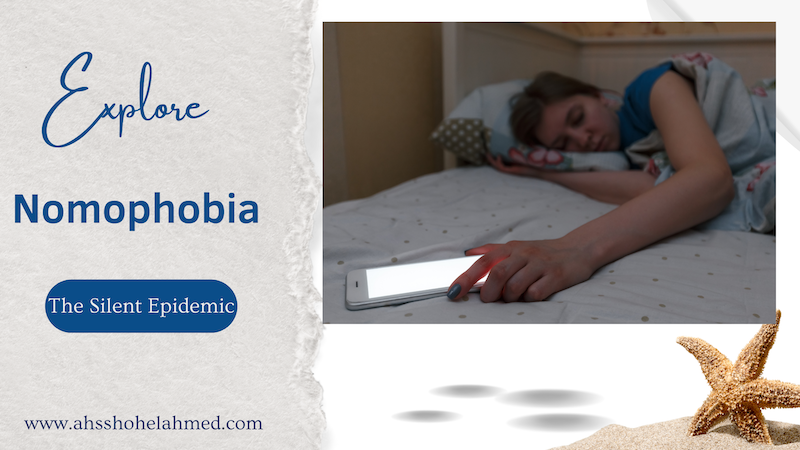Introduction
In today’s digital era, where smartphones have become an integral part of our lives, there is a growing concern about the impact of excessive phone usage on our well-being and relationships. Nomophobia, an abbreviation for “no-mobile-phone phobia,” refers to the fear or anxiety of being without your mobile phone or being unable to use it.
This article explores the silent epidemic of nomophobia and its detrimental effects on relationships.

What is Nomophobia?
Nomophobia, a term that gained prominence alongside the proliferation of smartphones, encapsulates the apprehension and unease people feel when distanced from their mobile devices. This phenomenon transcends the conventional fondness for our phones, instead revealing itself as an irresistible urge to keep them within immediate reach incessantly.
The Prevalence of Nomophobia
In our contemporary society, the escalating reliance on smartphones has led to the widespread prevalence of nomophobia. Research indicates that a substantial portion of individuals experience differing levels of nomophobia. This excessive attachment to mobile phones significantly impacts personal relationships and hampers social interactions.
Impact on Relationships
Communication Breakdown
Nomophobia can lead to a breakdown in communication between individuals. Constantly checking and using phones during face-to-face interactions can result in distracted conversations, misunderstandings, and a lack of active listening. This lack of focused communication can strain relationships and create distance between partners, friends, and family members.
Emotional Disconnect
Excessive phone use can contribute to emotional disconnect within relationships. When one or both partners are more invested in their phones than in each other, it can lead to feelings of neglect and isolation. Emotional intimacy requires undivided attention and genuine connection, which becomes challenging when phones take precedence.
Lack of Quality Time
Nomophobia often leads to a decrease in the amount of quality time spent together. Instead of engaging in meaningful activities or conversations, individuals may find themselves scrolling through social media or playing games on their phones. This shift can result in diminished bonding experiences and decreased relationship satisfaction.
Signs and Symptoms
Recognizing the signs and symptoms of nomophobia is crucial in addressing the issue effectively. Some common indicators include:
Anxiety and Restlessness
Individuals experiencing nomophobia may feel anxious and restless when their phones are inaccessible. The fear of missing out on important notifications or being disconnected from the online world can trigger these emotions.
Obsessive Checking Behavior
Constantly checking the phone for notifications or messages is a common behavior associated with nomophobia. The compulsion to stay connected can lead to a cycle of checking, even in inappropriate or inconvenient situations.
Irritability and Frustration
Individuals with nomophobia may exhibit irritability and frustration when separated from their phones. The inability to access their devices can trigger negative emotions and affect their overall mood and well-being.
The Role of Technology in Nomophobia
The development and advancement of technology play a significant role in the emergence of nomophobia. The convenience and connectivity offered by smartphones make them highly addictive. Social media platforms, instant messaging apps, and a constant stream of information contribute to the fear of missing out and further reinforce the dependence on mobile phones.
Strategies to Overcome Nomophobia
Setting Boundaries
Establishing boundaries around phone usage is essential in combating nomophobia. This can include designated “phone-free” periods during meals or specific activities and creating technology-free zones in bedrooms. Individuals can reclaim their presence and focus on nurturing their relationships by consciously limiting phone usage.
Digital Detox
Taking regular breaks from technology through digital detoxes is an effective way to break free from nomophobia. Unplugging from smartphones and engaging in activities that promote mindfulness and human connection can help individuals reestablish healthier relationships with technology.
Seeking Support
If nomophobia significantly impacts daily life and relationships, seeking professional support can be beneficial. Therapists or counselors can provide guidance and strategies to manage anxiety and dependency on mobile phones. They can help individuals develop coping mechanisms and explore the underlying causes of nomophobia.
The Importance of Open Communication
Open communication is vital in addressing nomophobia within relationships. Partners should openly discuss their concerns and establish mutual understanding regarding phone usage boundaries. This creates a safe space for expressing emotions and finding compromises that work for both individuals.
Establishing Healthy Phone Habits
Developing healthy phone habits is crucial in overcoming nomophobia. This includes being mindful of phone usage, setting realistic expectations for response times, and avoiding excessive multitasking while engaged in conversations or activities with loved ones.
Balancing Technology and Relationships
Finding a balance between technology and relationships is essential. Allocating dedicated quality time for meaningful interactions without distractions helps nurture connections and strengthens bonds. Being fully present and engaged in the moment promotes deeper understanding and emotional intimacy.
Impact on Mental Health
Nomophobia can have significant implications for mental health. Excessive phone use and the constant need for validation through social media can contribute to feelings of inadequacy, anxiety, and depression. It is crucial to prioritize mental well-being and seek professional help if necessary.
Supporting Each Other in a Digital World
Supporting each other in a digital world involves understanding and empathy. Encouraging healthy habits, such as practicing self-care, disconnecting from technology together, and actively engaging in offline activities, can foster stronger relationships and promote overall well-being.
The Role of Mindfulness
Practicing mindfulness can help combat nomophobia by increasing self-awareness and reducing reliance on smartphones. Mindfulness techniques, such as meditation and mindful breathing, can enhance the ability to be present and attentive in relationships, leading to deeper connections.
Setting Realistic Expectations
Setting realistic expectations around phone usage is vital. It is important to remember that immediate responses are only sometimes possible or necessary. Communicating openly about availability and establishing agreed-upon response times can alleviate anxiety and foster understanding.
Promoting Face-to-Face Interactions
Promoting face-to-face interactions and quality time can counteract the adverse effects of nomophobia. Engaging in shared activities, having meaningful conversations, and creating opportunities for genuine connection strengthen relationships and reduce dependency on digital devices.
Conclusion
Nomophobia poses a silent threat to our relationships, affecting communication, emotional intimacy, and quality time spent together. By recognizing the signs, implementing strategies to overcome nomophobia, and prioritizing offline connections, individuals can reclaim control over their lives and cultivate healthier relationships in the digital age.
Frequently Asked Questions (FAQs)
Q: How can I determine if I have nomophobia?
A: Common signs of nomophobia include anxiety when separated from your phone, obsessive checking behavior, and feeling restless without your device.
Q: Can nomophobia be treated?
A: Yes, nomophobia can be treated. Seeking professional support, setting boundaries, and practicing digital detox are effective strategies for managing nomophobia.
Q: Is nomophobia a serious condition?
A: While nomophobia may not be considered a clinical disorder, its impact on relationships and well-being should not be overlooked. It is essential to address nomophobia to maintain healthy relationships and emotional well-being.
Q: How can I reduce my dependence on my phone?
Setting limits on phone usage, engaging in activities that do not involve technology, and seeking professional support can help reduce dependence on mobile phones.
Q: Are there any support groups for individuals dealing with nomophobia?
A: Yes, support groups and online communities are available for individuals struggling with nomophobia. These platforms provide a space for sharing experiences and seeking advice from others facing similar challenges.
Final Thoughts
By addressing nomophobia and fostering healthier relationships with technology, individuals can regain control of their lives and strengthen their connections with loved ones. Remember, a healthy balance between the virtual and real world is key to maintaining fulfilling relationships in our digital age.
